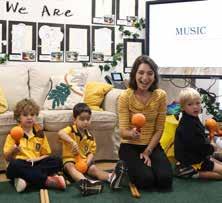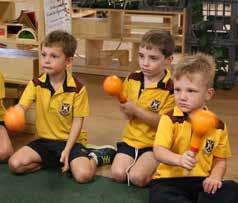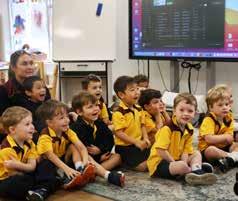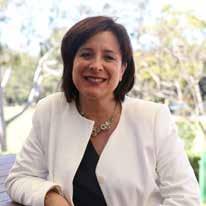
7 minute read
Junior School
Head of Junior School
Scotch Odyssey
Pastoral Care is of the highest priority at Scotch, and it underpins all we do in the Junior School to ensure our students’ wellbeing is nurtured and supported. The relationships between teachers and students is key in facilitating self-esteem, social skills and ensuring our children feel valued and safe. In turn, this leads to the best holistic approach to academic, social and emotional growth.
Recognising and praising children when they have made a great choice is one way we acknowledge effort and build confidence. For example, we want to acknowledge and reward children when they are persevering, demonstrating effort or resilience in a situation, or supporting a friend.
The Scotch Odyssey is an initiative that works to reinforce these skills and encourage children.
Jax Jayasinghe and Reid Warrick (Year 3) on their way to collect their Fergus stickers in their diaries
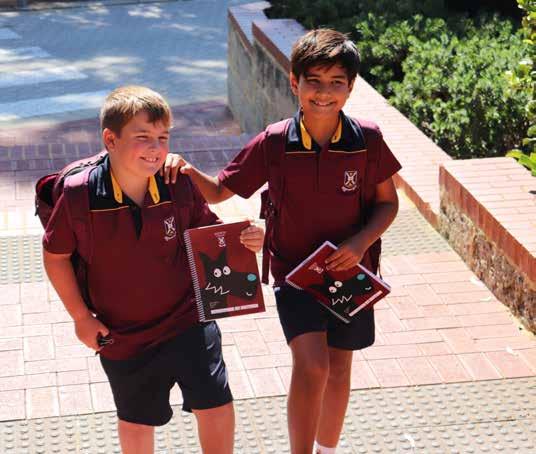
Embarking on an Odyssey
Meet Fergus. He is new to Scotch Junior School this year, and he wants to take his new Scotch friends on an odyssey throughout Scotland to discover the amazing land of the Scots.
Boys can journey through Scotland by working hard inside and outside the classroom to earn paw-print stamps in their Junior School diary from Fergus. Each time they earn six paw prints they arrive at the next destination on the map.
Fergus and I add a sticker to the boys’ diaries at each destination. There are 15 destinations in the Odyssey and thus 15 stickers to collect.
Those who complete the Odyssey can travel to Headmaster Dr O’Connell’s office to receive a very special treat, entrusted to him by Fergus.
Nature School: Year 2
“Play is what happens when children are propelled by a desire to know and understand, or by the thrill of attempting to transcend their previous limits.” — Bob Hughes
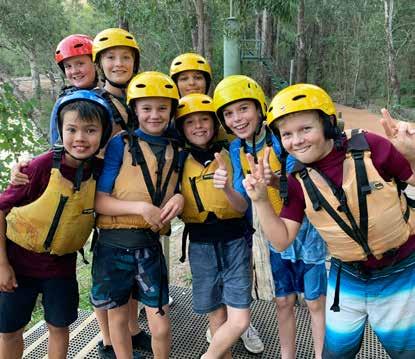
This year, an exciting new programme has become a permanent fixture in the Year 2 curriculum: Nature School. Each week, the Year 2 cohort explores the beach, river or works in nature spaces on campus.
The Nature School programme is a rite of passage for our Year 2 boys in their final stage of Early Years (PreKindergarten to Year 2). Several international studies have shown that learning in a natural environment helps improve information recall, focus and attention, executive function, fine and gross motor skills, creative problem solving and creativity. The environment is seen as the third teacher and provides rich, authentic opportunities for learning. Moving learning outdoors expands children’s sense of wonder and encourages their imagination and inquisitive nature.
Each week the boys focus on the five habits of learning. The five habits incorporate collaboration, imagination, persistence, inquiry and discipline. After an outdoor session, the boys reflect on the habit they used the most. Outdoor learning develops children’s social-emotional regulation and enables them to have positive feelings about each other, their learning environment and a sense of ownership and responsibility to nature. Importantly, outdoor space gives children a real sense of independence, allowing them to develop naturally and safely.
We encourage parents to volunteer at our river and beach sessions. Observing their child using the five habits of the mind has helped parents at home.
“Since going to River School, I now give my children more independence and ownership of things they do at home. They are more capable than I ever thought they were. River School has taught me to sit back, watch and allow my children to take risks.” – Gemma, Scotch parent
Mrs Fiona Alexander and Miss Rebecca Sayers
Year 2 Teacher and Year 1 Teacher
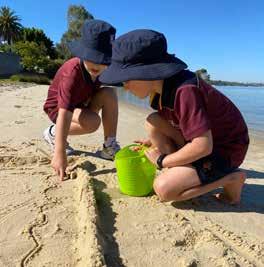
Top: Year 5s (front row) Alexander Rogers, Jaxson Lee, Benjamin Roberts, Oscar Seaburne-May, Magnus Wilson, (back row) Lachlan Gillett, Eli Rigg and Aahaan Ohri Right: Year 5s at Moray Camp
Moray Camp: Year 5
Year 5 is the final year of the Junior School at Scotch. To help mark the importance of this final stage, the boys experience their first camp at Moray, Scotch’s Outdoor Education Centre in Dwellingup.
The camp is a wonderful way for students to spend time together as a Year 5 group, getting to know each other and their teachers in a completely different setting. For some boys, this event is their first time staying away from parents, or it may even be their first experience of sleeping in a tent! Whether an experienced camper or not, each boy gains several important skills ranging from building independence to challenging their physical fitness, to fostering and strengthening friendships. As part of relationship building, the boys are grouped into three teams and work together to solve problems and play games throughout the camp. They are partly responsible for running the camp, including setting up for meals, cleaning up shared spaces and setting and packing up tents.
The experience begins with a symbolic entry, walking along the Bibbulmun Track into Moray. Not only is this a great physical activity, but it also enables a rich experience of the bush, seeing nature up close with stops along the way to appreciate the local wildlife and flora. The boys go rafting on Lane Poole Reserve and complete an Amazing Race. For the latter, they work in small groups to complete activities at different checkpoints; climbing a rock wall, carting water, crawling through mud and fitness stations, and finally, orienteering with an introduction to using compasses to find clues and solve puzzles.
Woven throughout the camp are opportunities for mindfulness, reflections on overcoming obstacles, practising gratitude, stargazing and quiet time to think in nature. One of the best parts of camp is seeing boys away from their devices, connecting face-to-face and engaging with the natural world. Boys delight in pushing through their perceived limits, whether conquering a bout of homesickness, completing push-ups, getting dirty in the mud or completing the long walk.
Finally, the camp allows the boys to just be kids! There is time to play, socialise, let out all the energy, be outside, and time for fun!
Music
EVERY DAY
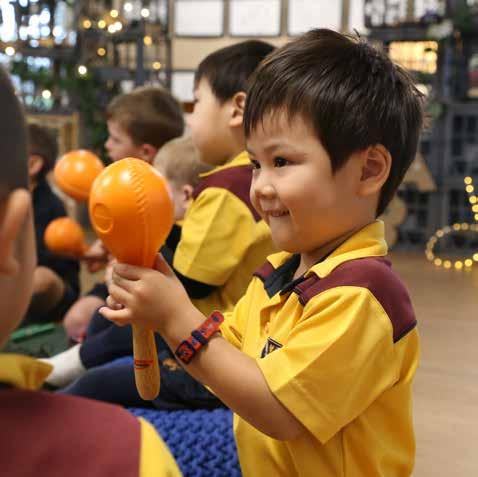
Scotch College has an excellent classroom Music programme, featuring a unique application of Kodály, Orff and Dalcroze concepts of Music education in the Junior School.
Sho Tanaka (Kindergarten)
Our Sing to Learn programme, in particular, provides deep learning opportunities for Kindergarten and Pre-Kindergarten students. The programme is based on research that identifies the benefits of daily music instruction. Daily music study has a positive impact upon regular schooling outcomes, as it enables the development of highly flexible, focused and skilled minds.
Sing to Learn offers students music experiences on a daily basis. Not only is it beneficial for students’ musicianship skills, but it also enhances their spatial understanding, literacy skills and numeracy skills. Many scientific studies have found that music education can directly impact brain development by: • Improving cognitive function, • Helping memory systems to work, • Helping us to learn a language, • Moderating our emotional states, • Solving complex problems, and • Helping our brains to be healthier later in life. In recent years, there has been a significant body of research conducted by neuroscientists exploring the impact of music on brain development. Neuroscientists found that the structures and functions from musicians’ brains were quite different from that of non-musicians. Their studies showed that not only did their brains look different from but they also functioned more effectively. Scientific studies demonstrate that music education stimulates three areas of the brain at once: the auditory, visual and motor cortices.
Between the two hemispheres of the brain, there is a bridge (corpus callosum), which allows messages to travel. Neuroscientists identified that musicians have a much larger bridge, and the messages that travel between the two hemispheres move in more creative pathways and at a much faster pace. Their studies revealed that musicians have high levels of executive function (a set of mental skills used when solving complex problems involving logical, conceptual, strategic and emotional elements), highly developed memory systems and can solve problems and puzzles creatively and effectively. Neuroscientists discovered that the general cognitive capacity is raised for any student who participates in music education. According to their research, the greatest gains can be made for students who undertake regular music activities before the age of seven.
Music education is a core part of the national curriculum. At Scotch, we believe that Music education is essential for every child, which is why we will continue to expand our programme offerings for all Junior School students.
Mrs Angela Paunoski and Mrs Jennifer Sullivan
Music Teacher and Music Curriculum Coordinator
